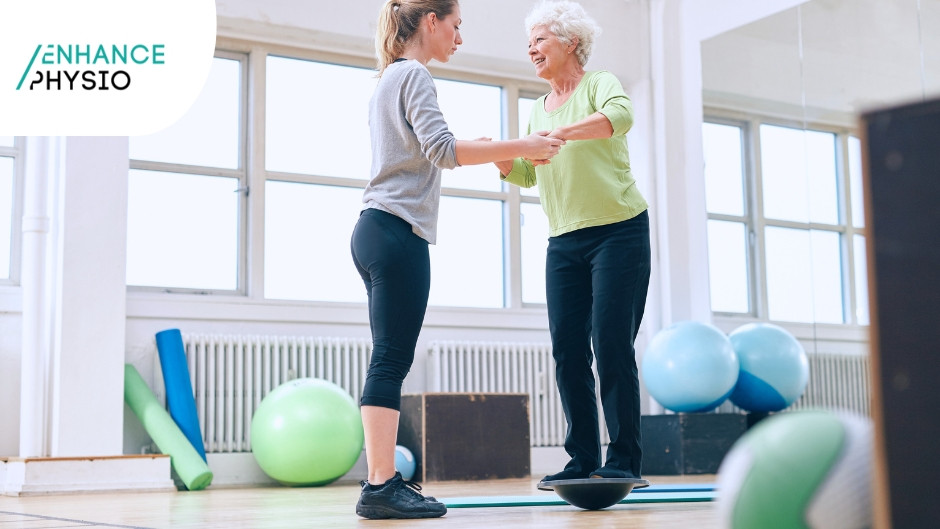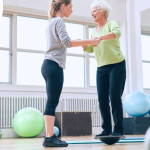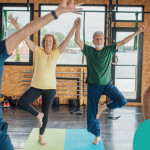Personalised Solutions for Enhanced Physical Ability
At Enhance Physiotherapy, we understand the significance of maintaining balance and preventing falls, particularly for individuals of all ages in Wodonga. Our physio Wodonga services focus on providing comprehensive assessments and personalised exercise programs designed to enhance strength, mobility, and overall balance. By adopting evidence-based interventions, we assist our clients in reducing the risk of falls and improving their quality of life. Our approach is tailored to meet individual needs, ensuring everyone receives the most effective care possible.
Improving Balance to Prevent Falls
Have you ever noticed how easily a small slip or stumble can lead to a serious injury, regardless of age? It’s astonishing how a moment of imbalance can change your life in an instant, prompting the question: How can we improve our stability and reduce the risk of falls?
Falls are not just an inevitable part of ageing; they can affect anyone, from energetic toddlers to sprightly seniors. The statistics surrounding falls are alarming, with millions of people experiencing fall-related injuries each year. As our lifestyles evolve and our environments change, learning effective falls and balance strategies is crucial for everyone.
Whether you’re a busy parent juggling daily chores or a grandparent aiming to enjoy life with greater independence, incorporating balance strategies into your routine is essential. It’s not merely about preventing falls; it’s about enhancing overall fitness and confidence.
Systems That Influence Falls and Balance
- Visual system: Your eyesight plays a crucial role in maintaining balance.
- Vestibular system: This is your inner ear’s balance system.
- Proprioceptive system: This involves the sensory receptors in your muscles and joints that provide information about your body’s position.
Common Risk Factors That Cause Falls and Impaired Balance
Falls and balance issues are a concern for people of all ages, though the risk does increase as we get older.
- Age-related changes
- Muscle weakness
- Vision problems
- Inner ear issues
- Certain medications
- Home hazards
- Chronic health conditions
- Alcohol
- Being overweight
Falls Prevention Strategies for People of All Ages
1. Regular physical activity
Importance: Staying active is crucial for maintaining muscle strength, flexibility, and balance, which are all vital for preventing falls.
Recommendations: Aim for at least 150 minutes of moderate aerobic activity per week, along with muscle-strengthening exercises on two or more days.
Examples: Walking, swimming, cycling, dancing, or joining a fitness class.
2. Home safety
Remove hazards:
- Clear walkways.
- Remove clutter and tripping hazards.
- Use non-slip mats in bathrooms and kitchens.
- Secure loose rugs.
Improve lighting: Ensure good lighting, especially in hallways, stairs, and bathrooms.
Install grab bars: Consider installing grab bars in bathrooms and near stairs for added support.
Sturdy furniture: Ensure chairs and beds are sturdy and easy to get into and out of.
Wear appropriate footwear: Choose shoes with good traction and support.
3. Medication review
Importance: Certain medications, especially multiple medications can increase the risk of falls, so discuss your medications with your doctor.
Action: Regularly review your medications with your healthcare provider to ensure they are appropriate and safe.
4. Eye health
Importance: Poor vision can contribute to falls, so ensure your vision is checked regularly.
Action: Get regular eye exams and wear glasses if needed.
5. Healthy lifestyle
- Maintain a healthy weight.
- Eat a balanced diet.
- Stay hydrated. Dehydration can cause dizziness and increase the risk of falls.
- Limit alcohol consumption.
6. Sleep hygiene
Poor sleep is associated with increased fall risk, so practice good sleep habits.
7. Foot care
Maintain healthy feet and wear well-fitting, supportive shoes. Avoid high heels and slippery footwear.
Balance Training Strategies for People of All Ages
Maintaining good balance is crucial for people of all ages, and incorporating fall and balance strategies into daily life can significantly enhance overall well-being.
Specific exercises can challenge your body’s balance and improve your ability to recover from a loss of balance.
1. Strength training
Strengthening leg and core muscles is vital for stability. Squats, lunges, and calf raises are beneficial.
2. Flexibility exercises
Stretching improves range of motion and reduces stiffness, which can contribute to balance difficulty and cause falls.
3. Balance exercises for people with poor balance
- Single-leg stance: Stand on one leg, holding the position for increasing durations.
- Heel-to-toe walking: Walk in a straight line, placing the heel of one foot directly in front of the toes of the other.
- Tai chi and yoga: These practices involve slow, controlled movements that improve balance and flexibility.
- Sit-to-stand: Practice standing up and sitting down from a chair without using your hands.
- Balance board exercises: Using a platform balance board or BOSU ball can challenge and improve balance.
By incorporating these balance strategies into your daily routine, you can enhance your stability, reduce your risk of falls, and improve your overall quality of life. Consult a physiotherapist Wodonga for personalised balance training advice.
Final Thoughts
Prioritising falls and balance strategies is a vital investment in the quality of life for people of all ages. From strengthening your core to practising mindfulness and agility, these simple yet effective strategies can empower you to move confidently and embrace life’s adventures.
Remember, it’s never too early or too late to take charge of your balance—after all, a steady foundation today means a more secure tomorrow. So, step boldly into each new day, and let your balance be the key to unlocking endless possibilities!
Take Control of Your Balance Today!
 Wodonga is a vibrant city in regional Victoria known for its scenic beauty and strong community spirit. We provide physiotherapy services for falls and balance strategies, catering to people of all ages in Wodonga and its surrounding suburbs. Our team offers personalised care to help individuals maintain their independence and quality of life.
Wodonga is a vibrant city in regional Victoria known for its scenic beauty and strong community spirit. We provide physiotherapy services for falls and balance strategies, catering to people of all ages in Wodonga and its surrounding suburbs. Our team offers personalised care to help individuals maintain their independence and quality of life.For those looking to enhance their balance and reduce fall risks, we offer comprehensive physiotherapy Wodonga services tailored for people of all ages. Our approach provides a pathway to improved mobility and a healthier, safer life. By embracing our personalised strategies, you can achieve a more balanced and independent lifestyle.





